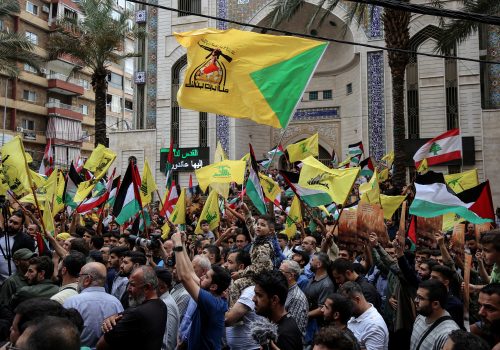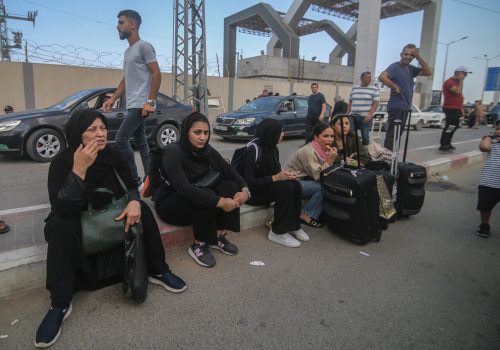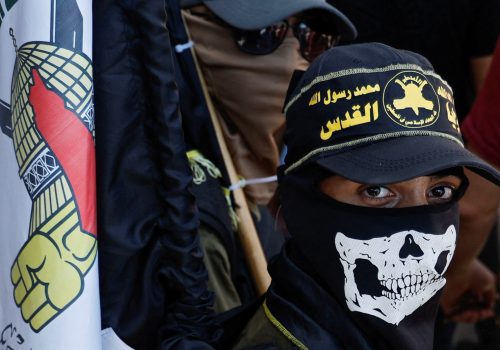The Israel-Hamas war is a distraction from Ukraine, but Russia isn’t necessarily benefiting
Since the outset of the conflict between Hamas and Israel on October 7, two main themes have emerged in the Russian response.
On the one hand, Russian President Vladimir Putin and Foreign Minister Sergei Lavrov have blamed the conflict on what they consider to be America’s flawed Middle East policies. The duo have also advocated a ‘balanced’ approach to resolving the conflict, decrying civilian casualties on both sides, calling for a ceasefire and humanitarian assistance, and proposing the revival of diplomatic efforts via the Quad (Russia, the United States, European Union, and United Nations) to resolve the Israeli-Palestinian dispute via a two-state solution.
On the other hand, numerous high-profile Russian politicians and commentators have issued statements that have been highly critical of Israel, blaming it for the violence and castigating the West for its “double standards” in criticizing Russian military action against Ukraine while supporting Israeli military action against the Palestinians. Some commentators have claimed that Russian military actions in Ukraine are “moderate” compared to Israeli military actions in the Gaza Strip. The Russian media has also portrayed Israeli actions as being directed not just against Hamas but against Muslims in general. While a few Russian commenters have issued statements that have been supportive of Israel and critical of Hamas, the overwhelming thrust of Russian commentary has been anti-Israeli.
Some Russian commentators have even claimed that Ukraine has provided weapons to Israel, while Putin has suggested that Western arms intended for Ukraine have wound up in Israel via the black market. Statements such as this may be meant to persuade Arab audiences, in particular, not to sympathize with Ukraine because Western military support for Ukraine is being diverted to Israel for use against Palestinians.
The balanced approach to resolving the conflict articulated by top Russian leadership thus starkly contrasts with the harshly critical line toward Israel being advanced by numerous politicians and commentators, who presumably would not issue these statements if they thought the Kremlin opposed them. At the very least, this anti-Israeli tenor of Russian media commentary underlines Israeli concerns that Moscow can serve as a neutral mediator in the conflict. The angry response of the Israeli foreign ministry to the announcement that a Hamas delegation was received in Moscow on October 26 is an indication that Israel does not see Russia as a credible mediator.
Many Western commentators have argued that Moscow benefits from the current Israel-Hamas conflict, since it diverts the world’s attention from the war in Ukraine and may even result in America diverting arms supplies originally intended for Ukraine to Israel. Yet, while there is undoubtedly merit to this argument, this conflict also poses risks for Russia. The eruption of conflict between Israel and Hamas, which creates the potential for an even broader conflict—possibly involving Lebanese Hezbollah in the North and Iran—poses dangers for Moscow, too.
Ever since he came to power, Putin’s approach to the Middle East’s many conflicts has usually been to avoid supporting one side against the other (with Russia’s support for the Bashar al-Assad regime in Syria against its internal opposition being an exception). He has preferred to support or cooperate with opposing sides simultaneously. There are numerous examples where Putin has succeeded at this: Israel and Iran; both Saudi Arabia and the United Arab Emirates (UAE) on the one hand and Iran on the other; Turkey and Syria; and the internationally recognized government of Yemen and the Houthis. Even in Syria, where Moscow has strongly backed the Assad regime against its internal opponents, Moscow has good relations with the Syrian Kurds resisting Damascus’s control.
Putin’s ability to cooperate with opposing sides simultaneously, though, works best when conflicts are just simmering. The outbreak, escalation, or revival of warfare that could result in one side severely weakening or defeating the other—like the one in Gaza right now—could present Moscow with difficult choices. Putin might have to quickly support one side and, thus, lose influence with the other, or decide to avoid involvement entirely and possibly lose influence with one side or even both.
Indeed, after years of supporting Armenia against Azerbaijan, Moscow’s recent acquiescence to the rapid Azeri takeover of Nagorno-Karabakh, which led to the flight of virtually its entire Armenian population to Armenia proper, suggests that Russia’s preoccupation with Ukraine has limited its ability to operate elsewhere, including in the former Soviet space. It is doubtful, then, that Russia will be willing or able to help Hamas against a determined Israeli attack. Nor is Israel likely to see Russia as a plausible mediator if the hot phase of its conflict with Hamas has an inconclusive result.
Israelis fear focusing their military resources on Hamas could encourage Iran-backed Hezbollah to attack from southern Lebanon. This possibility, however, could also pose serious problems for Russia. At a time when opposition to the Assad regime seems to be reviving, an Israeli-Hezbollah war could result in Hezbollah redeploying its fighters—who are now in Syria helping prop up the Assad regime—to Lebanon, thus, making Moscow’s job there more difficult. The escalating conflict between Iranian forces in Syria and Israel could mean a decline in Russian influence over both. While Western and Ukrainian observers worry that the Gaza conflict will divert American and European attention away from Ukraine, it can also be said that Russian involvement in Ukraine has diverted Moscow’s attention away from Syria.
Hence, Russia’s calls for a “swift and unconditional ceasefire” may not just reflect any “humanitarian” concerns that the Kremlin may have, but a desire to protect Russia’s interests in the region against the damage resulting from an escalating conflict that Moscow would not be in a position to control. However, the anti-Israeli rhetoric coming out of Russia that Putin has permitted makes it highly unlikely that Israel will regard Moscow as a credible mediator. What mediation does occur, then, may have to be undertaken by the United States in combination with Middle Eastern governments able to work with Israel and Hamas—possibly Egypt and/or Qatar.
Even if Russia can be said to benefit from the Israel-Hamas conflict serving as a distraction to the war in Ukraine, Moscow’s influence in the Middle East could decline regardless of whether the war escalates, spreads, or is contained via a ceasefire or other conflict resolution efforts. Moscow’s distraction with Ukraine may mean that it simply does not have the capability to manage whatever outcome that transpires.
Mark N. Katz is a professor of government and politics at the George Mason University Schar School of Policy and Government and a nonresident senior fellow at the Atlantic Council.
Further reading
Wed, Oct 11, 2023
Hamas’s attack on Israel was straight out of Hezbollah’s playbook
MENASource By David Daoud
The genesis of Operation Al-Aqsa Flood appears to originate with Hezbollah, at least in part. The pressing question now is what will Hezbollah do next?
Sat, Oct 14, 2023
Egypt cornered over Israel’s war on Hamas
MENASource By Shahira Amin
Whether Egyptian President Abdel Fattah el-Sisi will bow under US and Israeli pressure remains to be seen.
Tue, Oct 10, 2023
Hamas’s attack underscores the need for US and Israeli policy to change course
MENASource By
Both Israel and the United States should engage in deep introspection at the policy level over their failure to deter Hamas’s brutal attack.
Image: Senior Hamas officials Bassem Naim and Moussa Abu Marzouk, and Russia's Deputy Foreign Minister Mikhail Bogdanov meet for talks on the release of foreign hostages, at a location given as Moscow, Russia in this handout image released on October 26, 2023. Hamas Handout/Handout via REUTERS


